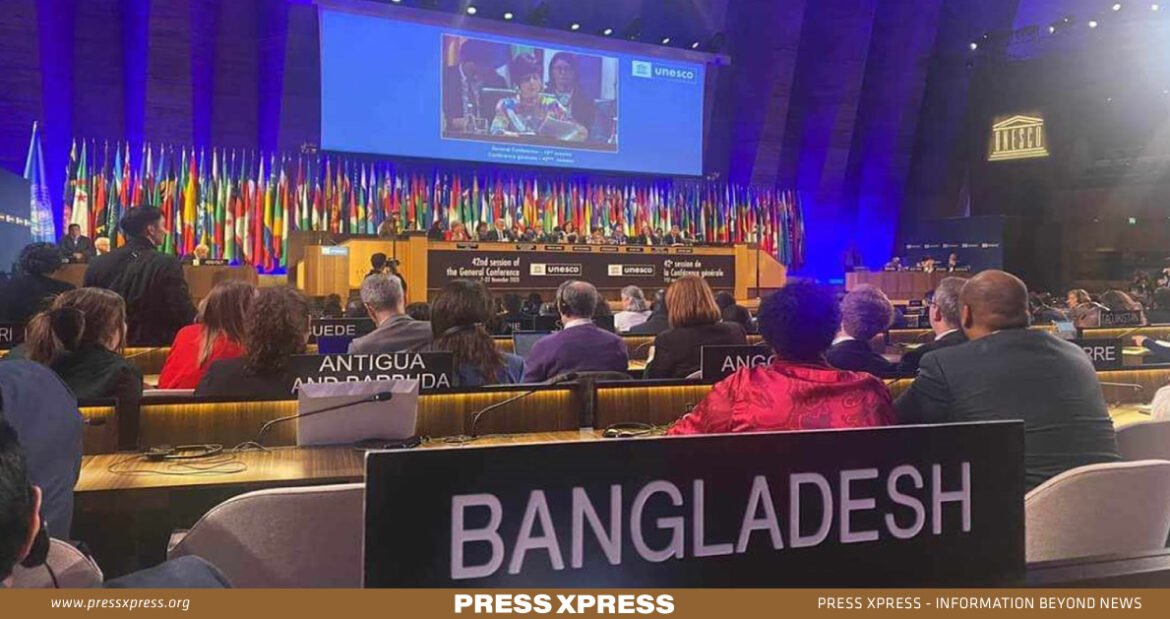- Bangladesh got 144 votes out of 184 votes
- Bangladesh was on the board several times with the latest 2017-2021
- Russia fails to be elected for the first time
In a resounding victory, Bangladesh has been elected as a member of the executive board of UNESCO for the 2023-2027 term, solidifying its influential role in the international arena. Out of the 184 participating members in the election held at UNESCO’s headquarters in Paris, Bangladesh secured an impressive 144 votes, as announced by Education Minister Dr Dipu Moni.
Expressing her gratitude, UNESCO Director-General Audrey Azoulay welcomed Bangladesh’s election to the executive board. This achievement marks the third contested election triumph for Bangladesh at UNESCO in the past eighteen months, showcasing the nation’s growing influence on global platforms. The earlier victories include positions at the Executive Council for Intergovernmental Oceanographic Commission in June and the Intergovernmental Committee for Safeguarding of the Intangible Cultural Heritages in July 2022.
Education Minister Dipu Moni, leading the Bangladesh delegation, attributed the success to the country’s deep engagement and diplomatic strides under the leadership of Prime Minister Sheikh Hasina. She emphasized Bangladesh’s commitment to collaboration, stating, “Our pledge is to work in partnership with all to accelerate the implementation of the Sustainable Development Goals.”
The other Elected Countries from Group IV
In addition to Bangladesh, the five other countries elected from Group IV Asian and Pacific States include Pakistan (157), Indonesia (154), Sri Lanka (144), Republic of Korea (129), and Australia (114). Education Minister Dipu Moni expressed gratitude to all member countries that supported Dhaka’s candidature.
The UNESCO Executive Board, one of the three constitutional organs of the UN agency alongside the General Conference and the Secretariat, is elected by the General Conference.”
Russia fails to be elected for the first time
In an unprecedented turn of events, Russia faced exclusion from the UNESCO Executive Board for the first time in history. According to the voting results published on UNESCO’s website, reveal that Serbia, Albania, Slovakia, and Czechia secured positions for Group II, designated for “Eastern Europe” on the Board. Russia had previously been a part of this group.
This recent outcome follows Russia’s expulsion from various international organizations, including the Council of Europe and the UN Human Rights Council, in the aftermath of its aggression against Ukraine. Notably, on November 9, Russia’s representative failed to secure a position on the International Court of Justice (ICJ).
Bangladesh’s achievements during previous terms
Having been a UNESCO member since October 27, 1972, Bangladesh has consistently contributed to UNESCO’s core mandates, encompassing education, culture, science, communication, and information. The country has previously held a position on the executive board during the 2017-2021 term.

The executive board plays a pivotal role in executing programs adopted by the UNESCO General Conference. Bangladesh’s rich cultural history has also been acknowledged by UNESCO, with the recognition of significant milestones such as the 1952 language movement, the proclamation of International Mother Language Day on 21st February, and the inscription of Father of the Nation Bangabandhu Sheikh Mujibur Rahman’s historic 7th March speech in UNESCO’s ‘Memory of the World.’
Furthermore, UNESCO has honored Bangladesh’s cultural heritage by including Jamdani Weaving and Mangal Shobhajatra on Pahela Boishakh in the representative list of Intangible Cultural Heritage of Humanity in 2013 and 2016, respectively. These recognitions underscore Bangladesh’s enduring commitment to the preservation and promotion of its cultural legacy on the global stage.
How Bangladesh can be benefited?
As Bangladesh assumes a pivotal role on the UNESCO executive board, it stands at the forefront of an unprecedented opportunity to not only secure diplomatic victories but also strategically address critical global issues. The nation’s proactive stance in the face of challenges such as climate change, cultural preservation, and educational advancements positions it to make a substantial impact on the international stage. The key now is to translate this diplomatic success into tangible actions that will significantly influence the trajectory of the nation’s development.
Bangladesh’s inclusion on the UNESCO executive board elevates its diplomatic standing, providing a robust platform for actively participating in discussions that mold international policies. This position empowers the country to contribute meaningfully to the development of global strategies across diverse sectors such as education, culture, science, communication, and information.
Aligned seamlessly with UNESCO’s mission, Bangladesh’s commitment to the Sustainable Development Goals (SDGs) positions it as a valuable contributor to the global pursuit of sustainable development. As an executive board member, Bangladesh is well-placed to play a proactive role in international efforts, particularly in areas like education, gender equality, and environmental sustainability.
By leveraging UNESCO’s influential platform, Bangladesh can not only showcase but also amplify the promotion of its intangible cultural heritage. This international recognition serves to enhance global appreciation for the rich tapestry of traditional practices, rituals, and art forms unique to Bangladesh.


